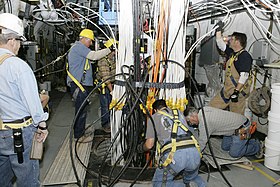| NTS series | |
|---|---|
 Krakatau subcritical experiment being lowered into the floor of the tunnel of the U1a Complex at the Nevada Test Site (2006). The cables extending from the hole will carry data from the experiment to recording instruments. | |
| Information | |
| Country | United Kingdom |
| Test site | NTS Area 19, 20, Pahute Mesa; NTS, Areas 1–4, 6–10, Yucca Flat |
| Period | 1962–1991 |
| Number of tests | 24 |
| Test type | underground shaft |
| Max. yield | 140 kilotonnes of TNT (590 TJ) |
| Test series chronology | |
Following the success of Operation Grapple in which the United Kingdom became the third nation to acquire thermonuclear weapons after the United States and the Soviet Union, Britain launched negotiations with the US on a treaty under in which both could share information and material to design, test and maintain their nuclear weapons. This effort culminated in the 1958 US–UK Mutual Defence Agreement. One of the results of that treaty was that Britain was allowed to use United States' Nevada Test Site for testing their designs and ideas, and received full support from the personnel there, in exchange for the data "take" from the experiment, a mutual condition. In effect the Nevada Test Site became Britain's test ground, subject only to advance planning and integrating their testing into that of the United States. This resulted in 24 underground tests at the Nevada Test Site from 1958 through the end of nuclear testing in the US in September 1992.
The United Kingdom signed the Comprehensive Nuclear Test Ban Treaty in 1996 and ratified it in 1998, confirming the British commitment towards ending nuclear test explosions in the world.